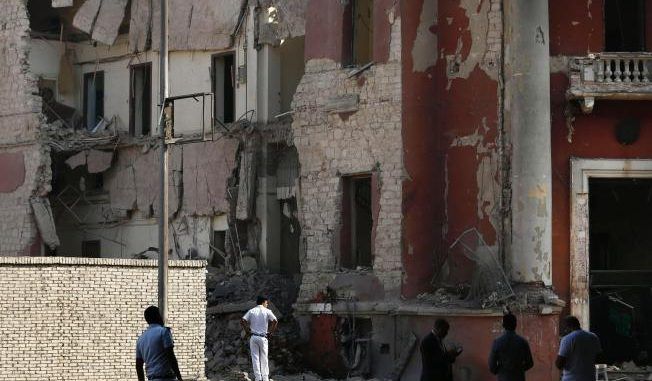
An Islamic State affiliate group has claimed responsibility for the car bomb attack at the Italian consulate in Cairo.
ISIL loyalists in Egypt have killed one person and injured several others when they exploded a car bomb outside Cairo’s Italian consulate on Saturday morning.
The car bomb attack shattered the Italian consulate and turned parts of the red brick building into rubble. The explosion also ruptured underground water pipes that flooded nearby streets. Nine people were reported injured and one killed as the Islamic State loyalists in Egypt took responsibility for the attack.
The Telegraph reports:
In a statement posted on Twitter, a group calling itself “Soldiers of the Islamic State in Cairo” said they had used a car bomb rigged with 450kg of explosives.

BYPASS THE CENSORS
Sign up to get unfiltered news delivered straight to your inbox.
You can unsubscribe any time. By subscribing you agree to our Terms of Use
“We advise Muslims to stay away from these security dens, because they are legitimate targets for strikes of the mujahedeen,” the statement added.
It was not immediately clear whether the militants had direct links to another cell which has carried out car bombs and beheadings in Egypt’s restive Sinai Peninsula.
The Italian consulate sits on a downtown Cairo street that would usually be bustling with cars and crowds by mid-morning. The Italianate strawberry building had been one of only two diplomatic missions to remain open in downtown Cairo. Most have left for more secure neighbourhoods over the years on account of security concerns.
Responding to the news on Twitter, Italian foreign minister Paolo Gentiloni said there were no Italian victims in the blast. “Italy will not be intimidated,” he wrote.
Egyptian officials said the person killed was a civilian, while those wounded were policemen guarding the building and passers-by.
Police detained several foreign journalists in the immediate aftermath of the blast, claiming that the timing of their arrival was suspicious. They were later released.
The consulate had enjoyed several incarnations since it was built. First a school and later a prison, it only began diplomatic functions after the Second World War.
Saturday’s attack underscored the depth of the challenge faced by Egyptian president Abdelfattah el-Sisi in the shape of the country’s fragmented but far reaching militant insurgency.
On the country’s eastern flank, Islamic State of Iraq and the Levant (Isil) loyalists have killed hundreds of security personnel in recent years. On July 1, the group – known as Sinai Province – launched a twelve hour attack on the city of Sheikh Zuwaid, killing as many as 70 soldiers in one of the deadliest assaults on the military for decades.
In Cairo, Egypt’s prosecutor general was assassinated last month as he left his home, marking the most high profile political killing for more than two decades.
Across the capital, a shadowy network of militant groups has regularly launched opportunistic attacks on police personnel and judicial targets. A salafi-jihadist group known as Ajnad Misr claimed responsibility for the most deadly blasts.
Western diplomatic missions in Cairo have previously received warnings of unspecified threats. Nestled in the leafy neighbourhood of Garden City, the British Embassy was fortified last year with roadblocks and checkpoints.
Egypt’s insurgency has been accelerated by a police crackdown against opposition of all political stripes. Tens of thousands of people have been arrested in the two years since the current regime dislodged Islamist president Mohamed Morsi in a military coup. Torture of detainees is endemic and more than a hundred people have died inside Egyptian custody.
Militant groups make much of this repression in their propaganda.
But in regime circles, pressure for an intensified crackdown is likely to increase in the wake of Saturday’s attack. Hours after the blast, guests on state television were calling for Mr Sisi to move strongly against the militants, and prominent Egyptian editor Moustafa Bakry used his Twitter account to suggest that a reimposition of emergency law may finally be necessary.


